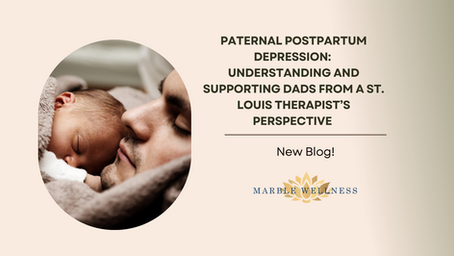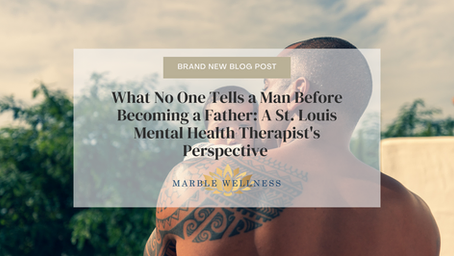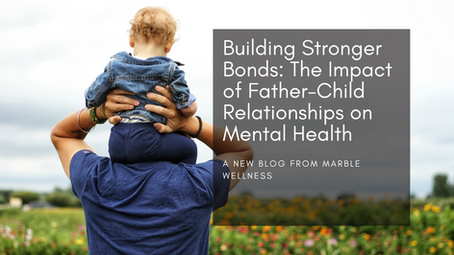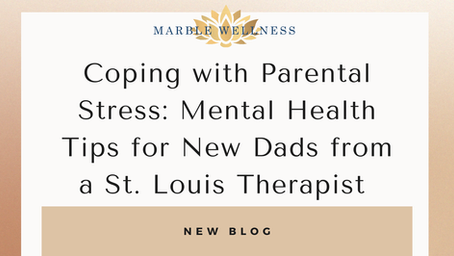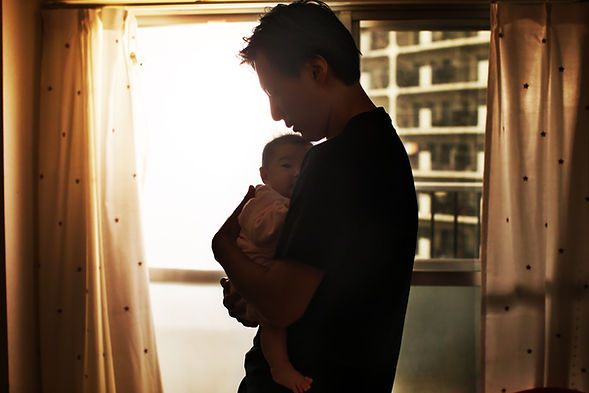
As a mental health therapist, my mission is to provide support, guidance, and understanding to individuals navigating the ups and downs of life’s significant milestones. In our recent series of blogs, we’ve talked about paternal stress; building stronger father-child relationships; and things no one tells a man before becoming a dad. Today, I want to shine a light on a topic that is often overlooked and misunderstood: paternal postpartum depression (PPPD).
While much attention has been given to postpartum depression in mothers, it’s crucial to recognize that new dads can also experience this condition. Studies suggest that approximately 10% to 25% of new fathers experience some form of postpartum depression, and this number is likely underreported.
PPPD can manifest differently from maternal postpartum depression, making it less recognized and often overlooked by both fathers themselves and those around them.
PPPD can start during pregnancy or within the first year after the birth of the child. Research shows that some fathers may experience depression during pregnancy, while others may develop it in the months following childbirth.
Certain factors can increase the risk of PPPD in fathers. These may include a history of depression or anxiety, a lack of social support, relationship stress, financial difficulties, sleep disturbances, and an unexpected or challenging birth experience.
Additionally, there is evidence to suggest a link between maternal postpartum depression and PPPD. If a mother experiences postpartum depression, the risk of the father also developing depression increases.
PPPD is a real and challenging experience that can impact fathers’ mental health during the early months of parenthood. In this blog, we will delve into the intricacies of PPPD, explore its signs, and provide practical ways to support dads who might be going through this emotional journey.
Signs and Symptoms of Paternal Postpartum Depression:
Paternal postpartum depression can manifest in various ways, and it’s essential to be attentive to the emotional well-being of new dads. Some common signs and symptoms to watch for include:
1. Withdrawal and Isolation:
A dad experiencing PPPD may withdraw emotionally from his family, and friends. He may seem distant, disengaged, or less interested in social interactions, hobbies, or activities he once enjoyed.
2. Anger or Irritability:
PPPD can lead to heightened irritability and uncharacteristic outbursts of anger. A dad may find himself getting frustrated easily, snapping at loved ones, or feeling inexplicably agitated.
3. Persistent Sadness:
Feeling persistently sad, hopeless, or experiencing a sense of emptiness can be indicative of PPPD. This emotional distress may manifest even when there are no specific reasons for feeling down.
4. Anxiety and Worry:
Dads with PPPD may experience intense anxiety and worry about their ability to be a good father, provide for their family, or handle the responsibilities of parenthood.
5. Lack of Interest:
Loss of interest in activities that once brought joy, a decline in productivity, or difficulty concentrating are potential signs of PPPD. A dad experiencing PPPD may stop participating in activities he once found enjoyable or fulfilling. This disinterest can extend to neglecting self-care or abandoning hobbies.
6. Feeling Overwhelmed and Inadequate:
PPPD can create a sense of being overwhelmed by the demands of fatherhood and feelings of inadequacy or self-doubt about parenting skills.
7. Changes in Sleeping Patterns:
Sleep disturbances or insomnia may arise due to heightened anxiety and stress. PPPD can disrupt sleep, leading to either insomnia or excessive sleeping. A dad may have difficulty falling asleep, wake up frequently during the night, or experience early morning awakenings.
8. Physical Symptoms:
PPPD can manifest through various physical symptoms, such as headaches, digestive issues, muscle tension, or general discomfort, even if there’s no underlying medical cause.
9. Apathy Towards Parenting:
A dad with PPPD may feel emotionally disconnected from his baby and less enthusiastic about engaging in parenting tasks like feeding, playing, or diaper changes. PPPD can have a significant impact on the quality of the parent-child relationship. Depressed fathers may struggle to engage emotionally with their babies, leading to potential disruptions in bonding and attachment.
10. Escapist Behavior:
As a way to cope with PPPD, some fathers may engage in escapist behaviors such as excessive alcohol consumption, substance use, or excessive time spent on distractions like video games or social media.
It’s crucial to remember that experiencing one or more of these symptoms does not automatically mean a dad has PPPD. However, if these symptoms persist for an extended period, intensify, or significantly impact a dad’s ability to function in daily life or care for his baby, seeking professional help is essential.
Recognizing and addressing PPPD early on is vital to prevent it from intensifying and impacting the overall well-being of the father, the family, and the infant’s development. A mental health clinician experienced in therapy for men in St. Louis can provide the necessary support and guidance to help fathers navigate through PPPD and regain emotional well-being.

Supporting Dads in St. Louis, MO with Paternal Postpartum Depression:
Offering support to dads experiencing PPPD is essential for their mental health and the well-being of the entire family. Here are some practical and empathetic ways to assist and uplift fathers during this challenging time:
1. Encourage Open Communication:
Creating a safe space for fathers to express their emotions openly is crucial. Encourage them to share their feelings, fears, and anxieties without judgment. Active listening and validation can make a significant difference in their ability to cope with PPPD.
2. Normalize Emotional Vulnerability:
Helping dads understand that it’s okay to experience a range of emotions during this life-changing period is crucial. Break the stigma surrounding mental health and paternal emotions, emphasizing that seeking help is a sign of strength, not weakness.
3. Share Parenting Responsibilities:
Assist dads in sharing parenting duties with their partners to avoid feelings of isolation and overwhelming responsibility. Working as a team allows both parents to bond with the baby and foster a sense of unity in the family.
4. Offer Practical Help:
Provide practical support, such as offering to take care of household chores, cooking meals, or babysitting. These gestures can alleviate some stress and allow dads to take some time for self-care.
5. Connect with Other Dads:
Encourage dads to join parenting support groups or attend workshops where they can interact with other fathers who might have similar experiences. These connections can provide a sense of belonging and validation.

6. Promote Self-Care:
Empower dads to prioritize their well-being by engaging in activities they enjoy, like hobbies, exercise, or spending time outdoors. A healthy and happy dad is better equipped to support his family.
7. Educate Partners and Loved Ones:
PPPD can affect family dynamics and overall family functioning. The emotional well-being of fathers is interconnected with the emotional health of mothers and the overall family’s harmony. Educate partners, family members, and friends about PPPD so that they can recognize the signs and provide support. Together, a strong support network can offer the empathy and encouragement that fathers need.
8. Seek Therapy for Men in St. Louis, MO:
If symptoms persist or intensify, encourage fathers to seek support from mental health therapists experienced in providing therapy for dads. Therapy can provide coping strategies and a safe space to process emotions.
Paternal postpartum depression is a real and valid experience that new fathers may encounter after the birth of their child. As mental health therapists, it is our responsibility to raise awareness about this condition and provide understanding and support to fathers going through it.
By recognizing the signs of PPPD and offering practical and empathetic support, we can ensure that dads receive the care they need to navigate the challenges of early fatherhood with resilience and strength. Together, let us work towards creating a society that fosters open conversations about paternal mental health and embraces fathers’ emotional well-being as they embark on this incredible journey of parenthood.
About the Author, St. Louis Therapist Skyler Martin, LMSW
Discover Skyler Martin, LMSW, a dedicated therapist committed to fostering emotional growth and healing, and member of the Marble Wellness team in St. Louis. With a wealth of experience supporting teens, adults, and couples, Skyler specializes in therapy for men, offering them a safe space to address their mental health needs. As an advocate for mental well-being, Skyler recognizes the significance of paternal mental health, delving into the complexities of fatherhood. Through his empathetic guidance, Skyler equips fathers to embrace self-care and emotional wellness, ultimately enhancing their relationships and overall quality of life.
Start Therapy for Mental Health in St. Louis
If you live in St. Louis and are ready to improve your mental health, we are here to help.
Contact Us!
Additional Counseling Services at Marble Wellness in St. Louis, MO and Chicago, IL
Counseling services designed to help set you on a path of living a more fulfilled, calm, and happy life.
St. Louis
Our St. Louis team of therapists have a variety of training backgrounds and areas of expertise. We specialize in anxiety, depression, grief, chronic illness, therapy for men, couples, and maternal overwhelm. We can also help new moms with various postpartum concerns, moms in the thick of parenting, and moms with teens. We can also chat from wherever you are in the state with online therapy in Missouri and online therapy in Illinois. No matter where you are in your journey, we would love to support you.
Chicago
Our Chicago team of therapists offer a wide range of mental health services to help our clients through the different challenges and hurdles in their life. In addition to anxiety, depression, grief, therapy for men, and maternal overwhelm, we are specialized in professional burnout, therapy for breakups, and love partnering with working moms.

